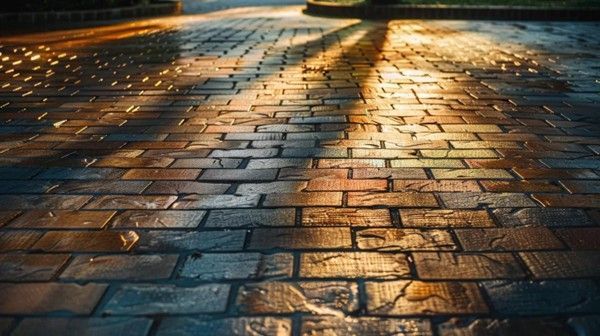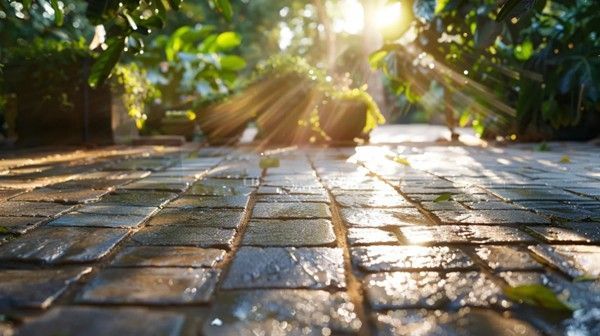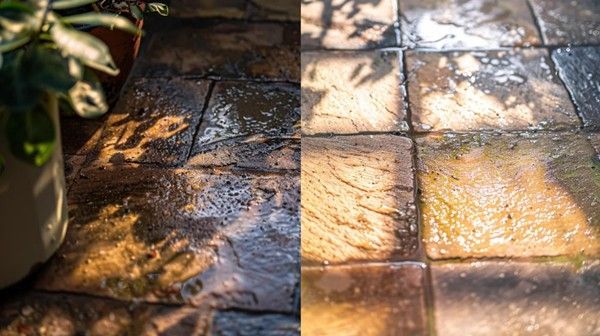How Paver Sealing Enhances Longevity of Your Surface
Are your pavers losing their shine and durability due to dirt, humidity, and pressure? Paver sealing can significantly enhance the longevity of your stone surfaces, protecting them from damage. This article will cover the benefits of sealing for durability, the sealing process, and maintenance recommendations to keep your pavers looking beautiful. Homeowners will learn how to extend the life of their pavers and prevent common issues that arise from neglect. Engaging with this content will provide practical solutions to maintain your pavers and enhance their overall appeal.
Key Takeaways
- Sealing pavers protects against stains, mildew, and weather-related damage, enhancing surface durability
- Regular maintenance and resealing every one to three years extend the life of paved surfaces
- Quality sealants improve the aesthetics and functionality of patios and driveways alike
- Homeowners benefit from significant long-term savings through reduced repair and maintenance costs
- Proper sealing enhances property value and curb appeal, attracting potential buyers in real estate markets
Understanding the Benefits of Paver Sealing for Durability
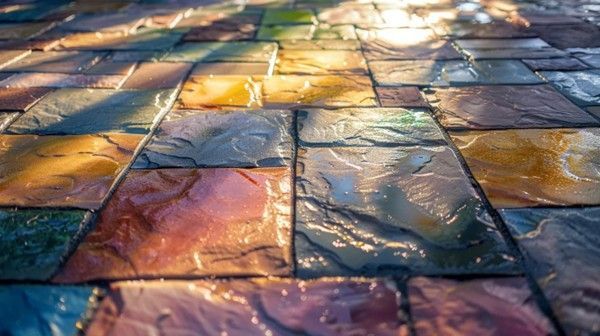
Paver sealing offers several key advantages for enhancing the durability of surfaces, including protection against oil stains and damage caused by vehicles. Misunderstandings around paver sealing often lead homeowners to overlook its benefits. This section will clarify these advantages and address common misconceptions regarding the care of brick and concrete pavers, highlighting how proper sealing extends the life of outdoor surfaces.
Key Advantages of Sealing Pavers
Sealing pavers provides essential protection for hardscapes, preventing damage from mildew, algae, and various debris. With treatments specifically designed for different surfaces, customers can enjoy longer-lasting beauty and functionality of their outdoor spaces. By maintaining your pavers through sealing, homeowners can reduce costly repairs and enhance the overall durability of their surfaces:
- Prevents the growth of mildew and algae, which can cause slippery surfaces.
- Blocks stains from oil and other substances that can harm pavers.
- Protects against weather-related damage and fading from sunlight.
- Minimizes the accumulation of debris that can lead to deterioration.
Common Misconceptions About Paver Sealing
Many homeowners hold incorrect beliefs about paver sealing, particularly regarding its effectiveness against water intrusion and mold growth. Some mistakenly assume that sealing is only about waterproofing and fail to recognize that sealing also influences the porosity of the paver surface, thereby extending its longevity. By investing in quality sealing services, homeowners can significantly enhance customer satisfaction, knowing that their outdoor spaces will remain protected against deterioration from environmental factors.
Sealing pavers brings strength and beauty, letting them shine for years. Next, discover how the sealing process works to keep your surfaces strong and lasting.
The Process of Paver Sealing to Extend Lifespan
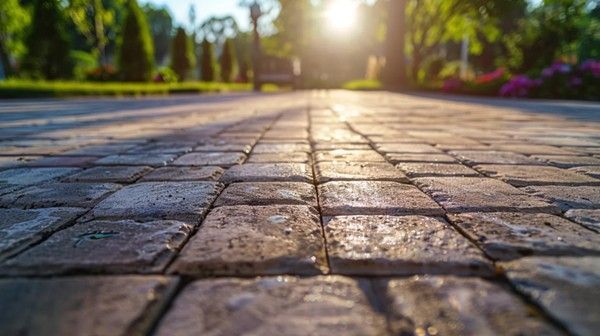
Preparing pavers before sealing is crucial for achieving long-lasting results. This involves cleaning the surface to remove debris and ensuring proper adhesion. Recommended sealant types provide a protective shield against wear and water damage while adding a desired gloss. Proper application techniques, such as using a sprayer for even coverage, further enhance durability and effectiveness, ensuring surfaces remain protected.
Steps for Preparing Pavers Before Sealing
Preparing pavers effectively before sealing is essential to ensure the longevity of surfaces like a deck or driveway. Start by cleaning the area thoroughly to remove dirt, debris, and any signs of efflorescence, which can impair adhesion. This step is particularly important as it allows the sealant to bond properly, protecting against damage from ultraviolet rays and various climate conditions that can lead to deterioration over time.
Recommended Sealant Types for Durability
Selecting the right sealant type is essential for enhancing the durability of paver surfaces, such as patios and walkways. High-quality sealants offer protection against elements like snow, rain, and UV rays, preventing erosion and maintaining the aesthetic appeal of outdoor spaces. Utilizing a sealant specifically designed for porous materials ensures that the surface remains resilient against challenges posed by weather and daily usage, ultimately prolonging the life of the pavers:
- Choose sealants that provide excellent resistance to water infiltration and erosion.
- Opt for products that enhance the color and finish of the pavers, making the patio or walkway visually appealing.
- Look for sealants that protect against freeze-thaw cycles, especially in regions with seasonal snow.
Application Techniques for Optimal Results
Proper application techniques are vital for achieving optimal results during paver sealing, ensuring longevity and durability. Professionals offering paver sealing services utilize specialized equipment, such as sprayers, to apply an even coat of environmentally friendly sealant across the surface, preventing stains and water penetration. Homeowners seeking to enhance their outdoor spaces should consider scheduling a free estimate to understand how proper application can protect their investments from damage and wear over time.
Paver sealing is just the beginning. To keep those pavers looking great, regular care is key.
Maintenance Recommendations for Sealed Pavers
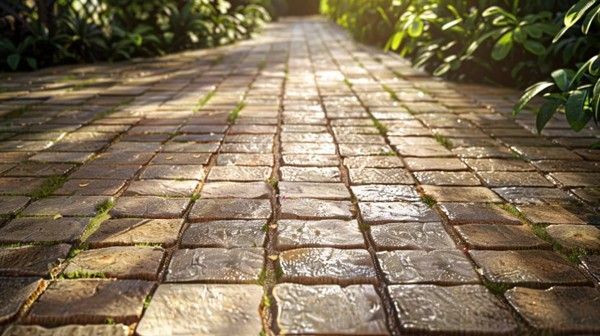
Proper maintenance is key to ensuring the longevity and durability of sealed pavers. Ideal cleaning methods, including the use of a brush to remove moss and debris, play a vital role in preserving their appearance. Homeowners should also be aware of the frequency of resealing for optimal performance and recognize signs indicating that the sealant requires renewal, thus preventing potential hazards that may arise from neglect.
Ideal Cleaning Methods for Longevity
To maintain the longevity of sealed pavers, homeowners should adopt effective cleaning methods to combat wear and tear. Regular brushing helps eliminate debris and moss, while pressure washing can be utilized to remove stubborn stains without damaging the surface. It is essential to avoid excessive moisture accumulation; therefore, ensuring that any sand used as a joint filler is replenished can further enhance the stability and appearance of the paver surface.
Frequency of Resealing for Best Performance
The frequency of resealing pavers is vital for maintaining their optimal performance, typically recommended every one to three years. This interval ensures that the adhesive properties of the sealant remain strong, effectively protecting surfaces from stains, weather damage, and wear. Homeowners can assess the condition of the sealant by checking for signs such as fading or an increase in moss growth, which indicates it may be time to renew the protective layer.
| Time Frame | Signs to Reseal | Benefits of Resealing |
|---|---|---|
| 1 Year | Fading color, moss growth | Restores protective layer |
| 2 Years | Visible stains, water absorption | Enhances surface aesthetics |
| 2 Years | Cracks or chips | Increases longevity |
Signs That Paver Sealing Needs Renewal
Homeowners should watch for several signs indicating that paver sealing requires renewal to maintain surface longevity. Visible fading of color, presence of moss, and noticeable water absorption are all indicators that the protective sealant may be wearing off. Regular inspection of these signs will help ensure that the outdoor surfaces remain shielded from damage, enhancing both the durability and appearance of the pavers.
Observing these conditions is essential:
| Time Frame | Signs to Reseal | Benefits of Resealing |
|---|---|---|
| 1 Year | Fading color, moss growth | Restores protective layer |
| 2 Years | Visible stains, water absorption | Enhances surface aesthetics |
| 3 Years | Cracks or chips | Increases longevity |
Pavers need care, but outside forces can wear them down quickly. Understanding these environmental factors is key to protecting your investment and making your pavers last longer.
Environmental Factors Affecting Paver Lifespan
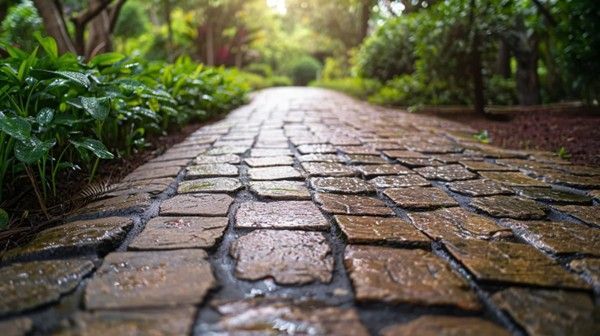
Weather conditions play a significant role in the durability of pavers, impacting their lifespan through various stresses. Factors such as rain, snow, and temperature fluctuations can lead to erosion and degradation. Additionally, UV exposure contributes to the fading and wear of paver surfaces. Understanding these influences is essential for homeowners to maintain their paved areas effectively.
Addressing these environmental impacts helps homeowners recognize the importance of regular sealing and maintenance. Each topic will provide insights into how to safeguard pavers against harsh climates and sunlight, ensuring enhanced longevity and overall performance.
How Weather Conditions Impact Paver Durability
Weather conditions significantly influence the durability of pavers. Factors such as heavy rainfall, snow, and drastic temperature changes can lead to erosion and cracks, reducing the lifespan of paver surfaces. Regular sealing acts as a protective barrier, shielding pavers from these environmental stresses while preserving their appearance and functionality.
Addressing how weather impacts paver surfaces is essential:
| Weather Condition | Impact on Pavers | Recommended Action |
|---|---|---|
| Heavy Rain | Causes erosion and water pooling | Apply a water-resistant sealant |
| Snow and Ice | Leads to cracking due to freeze-thaw cycles | Use freeze-thaw resistant products |
| High UV Exposure | Results in fading and wear over time | Regularly reseal to maintain color |
The Role of UV Exposure in Paver Wear
UV exposure significantly contributes to the wear and damage of paver surfaces. Over time, harsh sunlight can cause fading, leading to an unattractive appearance and diminishing the overall durability of the pavers. By investing in quality paver sealing, homeowners can create a protective barrier that not only prevents UV damage but also maintains the vibrant colors and integrity of their outdoor spaces, extending the life of the installation.
The life of a paver depends much on its surroundings. Investing in sealing can protect this investment, adding value as well as beauty.
Cost-Effectiveness of Paver Sealing for Longevity
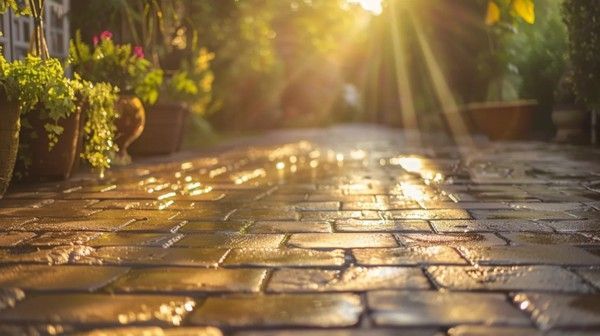
Investing in paver sealing provides significant long-term savings when compared to the initial costs. Through effective sealing, homeowners can protect their surfaces from damage and deterioration, ultimately enhancing property value. The subsequent sections will detail how these financial advantages manifest and the positive impact sealing has on overall property appeal and longevity.
Comparing Long-Term Savings Versus Initial Investment
Investing in paver sealing presents homeowners with notable long-term savings that surpass the initial costs. Over time, properly sealed pavers require less frequent repairs and maintenance, which translates to reduced overall expenses. By protecting surfaces against environmental damage, such as stains and erosion, homeowners ensure the longevity of their outdoor areas, ultimately preserving property value and enhancing curb appeal.
The Impact of Sealing on Property Value
Sealing pavers not only protects the surfaces from deterioration but also positively influences property value. Homeowners who invest in quality paver sealing typically see a significant return on investment, as well-maintained outdoor spaces enhance curb appeal. This aesthetic advantage can attract potential buyers, making the property more appealing in a competitive real estate market.
Paver sealing saves money and extends the life of your outdoor spaces. Next, real-life examples show just how effective this process can be.
Case Studies Demonstrating Paver Sealing Effectiveness
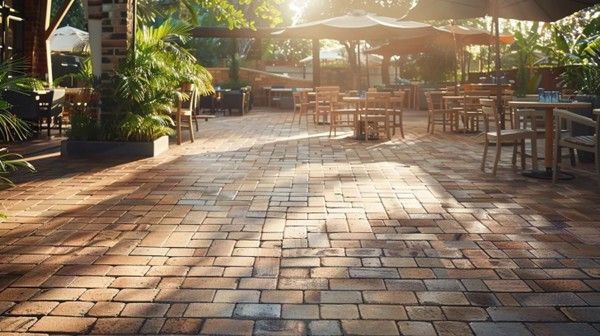
This section presents successful examples of paver restoration, illustrating how effective sealing enhances the longevity of hardscapes. It also includes testimonials from property owners who have experienced improved durability after sealing their pavers. By exploring these real-world applications, readers will gain practical insights into the benefits of paver sealing and its positive impact on outdoor surfaces.
Successful Paver Restoration Examples
Successfully sealed paver surfaces have shown remarkable transformations, with homeowners reporting significant improvements in both appearance and durability. One example includes a residential patio in South Florida, where professional sealing eliminated stains and protected the pavers from algae growth. Similarly, a Texas driveway not only regained its original color but also became resistant to harsh weather, showcasing how proper paver sealing can effectively extend the lifespan of outdoor surfaces.
From Property Owners on Enhanced Durability
Property owners who have invested in paver sealing consistently report enhanced durability and overall satisfaction with their outdoor surfaces. One homeowner in South Florida observed that after sealing their patio, the color remained vibrant and resistant to stains, even during heavy rain. Similarly, a Texas resident noted that their sealed driveway not only maintained its appearance but also held up well against the significant wear caused by frequent vehicles, showcasing the real benefits of professional paver sealing.
| Location | Property Type | Reported Benefits |
|---|---|---|
| South Florida | Patio | Color vibrancy and stain resistance |
| Texas | Driveway | Durability against wear and tear |
Conclusion
Paver sealing plays a crucial role in extending the lifespan of outdoor surfaces by providing essential protection against environmental stresses, stains, and erosion. Homeowners who prioritize sealing can enjoy significant long-term savings and maintain the aesthetic appeal of their properties. Regular maintenance, including resealing, ensures optimal performance and durability over time. Investing in quality sealing services not only safeguards against deterioration but also enhances property value, making it a wise choice for homeowners seeking to protect their investments.


